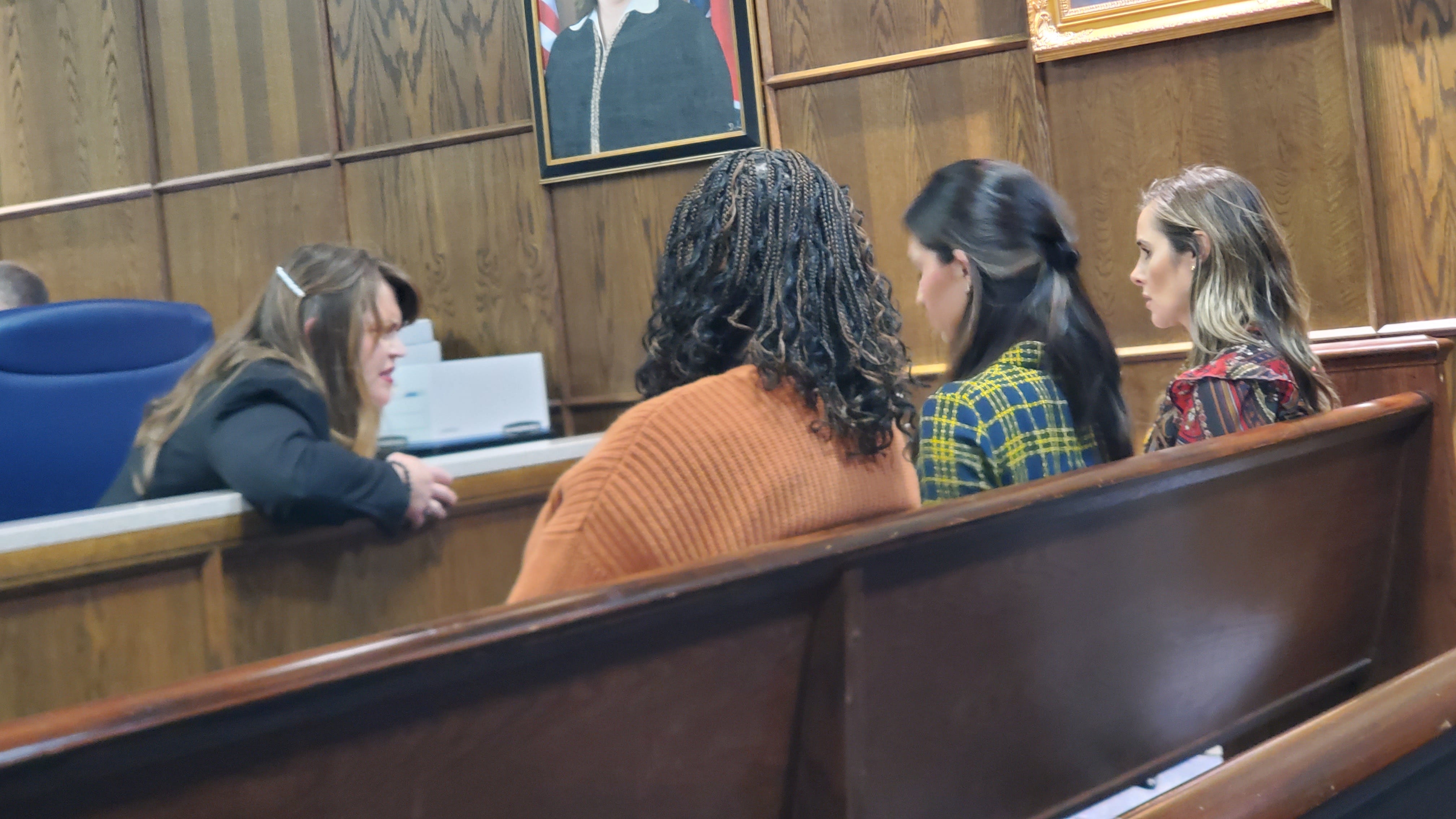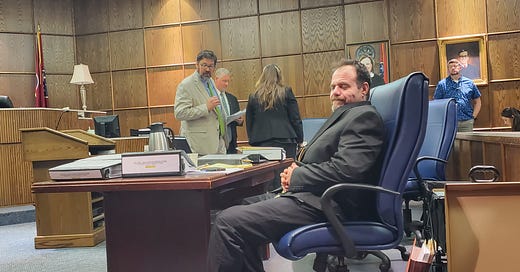Rzeplinski shows clear conscience on guns, but state rips 2 signatures on gov't forms
Prosecutor of '2A Ray' wants jury to believe decades of state OKs of his gun buys, permits mean nothing because he signed probation form that mentions felony


CHATTANOOGA, Tenn., Thursday, Aug. 1, 2024 – District attorney Coty Wamp was concerned about nothing in all my reporting and advising regarding jury nullification.
Her case state of Tennessee vs. Ray Rzeplinski appears to have been a deflated balloon all along, its crumpled form evident at the close of its case mid-afternoon on the second day of trial.
ADA Nicole Evans rests having put very little into the record suggesting Mr. Rzeplinski knew anything about being a felon, given many “cures” of his defective memory from a scrape with the law at age 19 and his alleged plea bargain from a felony down to a felony.
Her sole assignment, given all the facts of firepower seized by the sheriff, is to show he “knowingly, intentionally and recklessly” possessed and controlled firearms knowing he became a felon in a 1995 case, with a judgment rendered in 1996.
Miss Wamp’s team made the most of what it had – showboating 55 or so pistols, rifles and shotguns seized under the sheriff’s office under Jim Hamond. The armory has remained visible to the jury all trial, their existence and his possession effectively stipulated by attorney Ben McGowan.
Mr. McGowan, his case-in-full beginning Thursday, is working to show that 2A Ray “knew” he was not a felon and had no reason to live as if he were.
A witness Thursday indicated in a 2013 case weapons owned by Mr. Rzeplinski were returned to him by the department when a criminal allegation was settled and property ordered returned. Mr. Rzeplinski’s girlfriend Jackie Cordell, says he bought weapons from retail stores, each sale OK’d by a state background check, with no twinge of conscience, nor with any expression of his having beat the system.
Mr. Rzeplinski testifies about the 1995 burglary at a Bradley County grocery store by two of three buddies he took in his car on an errand to buy beer and cigarettes. Mike was passed out in the back seat. Two young men in the group stepped over door glass they’d shattered to get into the store; came out with a few dollars’ worth of cigarettes and snacks.
Mr. Rzeplinski had agreed to snitch on marijuana sellers, and wore a wire three times to help police. He’d been assured that at 19 his helping police would “keep this incident permanently off my record.” He reviews a document regarding the plea bargain, with no indication that he perceives that he is pleading to a felony. Jan. 11, 1996,
On the stand, he reviews judgment documents from Bradley County criminal court. ADA Nicole Evans gets him to admit that he signed a probation agreement and a plea bargain agreement, both speaking of judgment for offense with more than a year in prison. “My understanding at the time is not that I was pleading to a felony, no,” he says. “I was understanding was that I had to do my probation and it was behind me.”
The first reference Mr. McGowan makes regarding “the defendant’s state of mind” is in an attempt to play a soundfile from the hearing regarding his conviction. He also says, for the first time, that the state of mind is the crucial point the state needs to prove. Mr. Rzeplinski says at no time did a judge tell him that he was pleading to a felony.
The sound file indicates all four together pleaded guilty, with 2A Ray getting 30 days, and the rest is suspended. Jail, plus 30 days community service at rate of at least 2 days per months, according to gravelly voice of judge Mayo Mashburn. Mr. McGowan drops plans to play the proceedings.
Mr. Rzeplinski had many background checks on which he relies on in defense of his life.
“Did you rely on that system to identify your right to purchase a firearm?” Mr. McGowan asks.
“Yes.”
He had thumbs-up background check working for a licensed wrecker service. He worked for Bradley county government as contractor via Ray’s Plumbing and as a ServPro sub at the courthouse. One exhibit includes a 1099 IRS tax form from 2018 Bradley County, exhibit 76. Background checks have been routine, on the courthouse job and others. “I understood that, I remember, they ran a bakcground check on me, and I was responsible for the people under me.”
Mr. Rzeplinski attended an in-person 8 -hour gun safety course to get his permit, including lectures and shooting practice. A copy of the application, the yellow copy, is sent off to the local sheriff. NCIC, TBI, FBI involvement is de rigeur. An overseer of records at department of safety and homeland security, Diane Oliver, testifies if a permit is issued just after a search of the databases, that means that nothing to inhibit a permit has been found.
The warning about hiding something “with the intent to deceive” would bar the applicant getting the license, she says, but if a person didn’t know about his felony background, that wouldn’t be intent to deceive, she theorizes from the stand.
➤ Jackie Cordell, Ray’s girlfriend of 11 years, testifies that he never gave the slightest hint that he was a man with a felony record. She says he made no disclosures that he was prohibited from owning firearms, never intimated he was “getting away with something” or a “beneficiary of somebody’s screwup,” in the phrasings of attorney McGowan. He bought guns from numerous pawn shops, Academy, Firearms Plus, Wal-Mart and did not buy privately. He “was not hiding in the shadows when buying guns.” When deputies came to the house on false burglar alarm calls, they would come into a dwelling that had guns on racks or leaning against a dresser. “He has nothing to hide,” she says. “Come on in.”
➤ After proof ends, Judge Dunn rejects Mr. McGowan’s motion to dismiss all the charges based on insufficient evidence. She says that Mr. Rzeplinski’s probation order refers to a sentence up to 3 years while serving 30 days and other conditions. In his guilty plea document, it states he is pleading to felony. Based on his signature, 54 felony charges on felon in possession will go to the jury, she rules. She refuses to dismiss the short-barreled rifle charge because no mens rea or evil intent proof is required, but mere possession, so that is a matter for the jurors slated to get their charges and instructions Friday.
She grants an edit on the jury instructions to add an element of mistake of fact that Mr. Rzeplinski had in regard to 1995 and 1996 facts of personal status.



